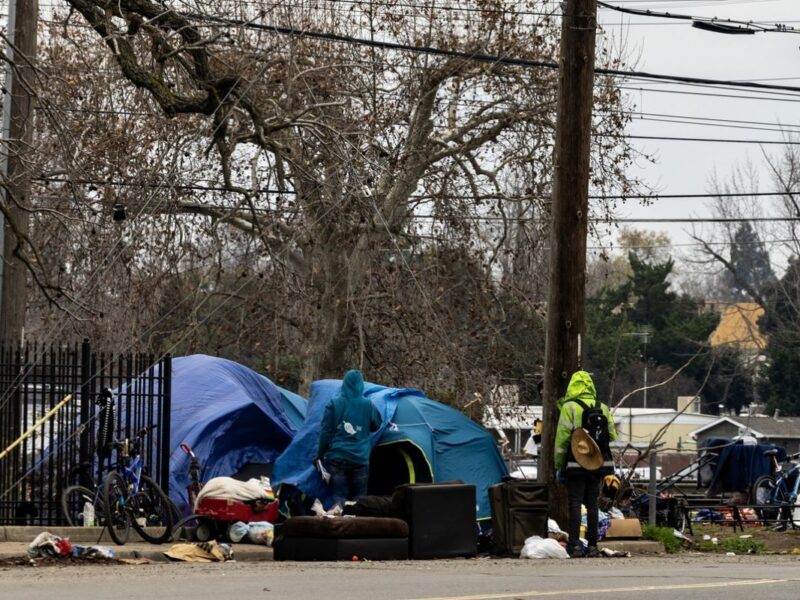Hunger Is a Warning Sign of Pending Homelessness
A quick Google image search of the term “homeless” is likely to conjure up plenty of photos of soup kitchen employees ladling sustenance into stranger’s bowls and individuals on roadsides with cardboard signs denoting extreme hunger. Catchphrases like “homeless and hungry” or “will work for food” are seen as synonymous with the homeless crisis. Consider outreach and housing advocacy. How much of this is centered around giving people meals?
We’ve broached this subject in the past, explaining the harm that can be caused by assuming that all homeless people need is a plate of food. It is as if dishes and sandwiches could somehow serve as replacements for a safe and stable place to live. Of course, they can’t. That notion is ridiculous. However, there is a relationship between homelessness and hunger, a connection that cannot and should not be ignored.
The problem is that we’re addressing hunger after a person becomes homeless when the wise approach would be to recognize that hunger first as a warning sign, a foreshadowing of darker moments to come.
First Hunger, Then Homelessness, Not the Other Way Around
We have been conditioned to think of hunger as an aftereffect of homelessness. We perceive hunger as a consequence or a result of the vagrant lifestyle. However, it is more accurate to note that hunger is a symptom of pending homelessness that often sets in long before someone becomes unhoused.
“Hunger is a symptom of poverty. It’s first going to be felt before homelessness, which is the worst-case scenario once people resort to skipping meals,” explained Sherrie Tussler, who serves as CEO of Hunger Task Force. This nonprofit food bank supplies 20 soup kitchens and homeless shelters in the Milwaukee area.
“As you lose your income, the first thing you’re going to do is start skipping meals. Because you’re going to try to keep that roof over your head, and you’re going to pay your utility bills,” Sherrie said. “And if you’re on medication, you’ll try to afford it. And so, as things start to slip away, you pay fewer and fewer bills. You might get into arrears around your utilities. You might have to rely on family or friends or a food pantry for your food just so you can keep that roof over your head.”
A Jaw-Dropping 39% of Americans Admit to Skipping Meals So They Can Pay the Rent
According to Yahoo! Finance, many Americans – 39% of the population, to be precise – admit to going hungry to make rent.
Suppose we hold food insecurity as a symptom of possible future homelessness. In that case, we see that the United States, with a population of roughly 333 million residents, has more than 100 million people in danger of becoming homeless. This should be food for thought for politicians.
In a riveting clip published by National Geographic, Christina Dreier, a wife and mother of toddlers, described the financial woes of being a farmer in America’s heartland. Despite dire efforts to remain afloat, the money going out for bills simply overshadows the amount of money coming in. This vicious cycle left her and her family dependent on food stamps and the local pantry.
“It’s never enough to buy groceries and pay for bills, so we always have to subsidize. Either we pay our bills or…” her voice trembled as she continued. “If we pay our bills, we don’t eat so good.”
Hunger Often Precedes Homelessness, While Food Might be More Plentiful on the Streets
As surprising as it sounds, the person or family teetering on the brink of homelessness is more likely to need food than someone who is already unhoused.
According to researchers Barrett A Lee and Meredith J Greif, who published an investigative piece entitled “Homelessness and Hunger,” findings suggest “hunger is not uniformly experienced by members of the homeless population.”
Indeed, hunger happens when families desperately try to cut corners and avoid homelessness by keeping a roof over their heads at any price, even if it costs them dinner from time to time. Understanding this correlation is vital to solving the homeless crisis.
Food Insecurity is on the Rise, and So Is American Homelessness
As food insecurity sweeps our nation, eclipsing the needs of more than 16.7 million households, choosing between food and other necessities is becoming even more common. Experts at the U.S. Department of Agriculture say food insecurity is up a staggering 23% in the past three years alone.
Some of the factors feeding into the crisis include:
- Unprecedented rates of inflation
- The loss of many pandemic-era programs, such as the Child Tax Credit, which was aimed at preventing hunger
- Unemployment
- Low or stagnant wages
And last but certainly not least, one of the leading causes of hunger in America is:
- The lack of affordable housing
Basic American Needs Are Falling by the Wayside Due to a Lack of Affordable Housing. Talk to Your Representatives.
Like so many issues surrounding the homeless crisis, hunger, a predictor of homelessness, is heavily connected to the current lack of affordable housing.
As you can see, the issue is circular. Housing is unaffordable, so people go hungry to pay their bills. That hunger puts them at an elevated risk of homelessness. Before they become homeless, the thing they really need is a meal. Once they are homeless, the thing they really need is a house.











